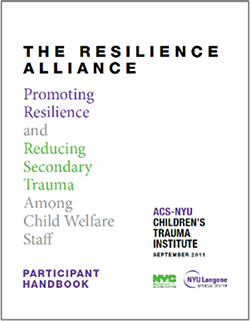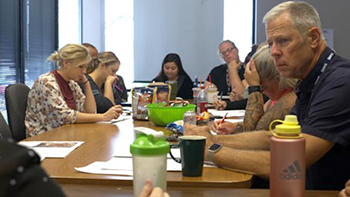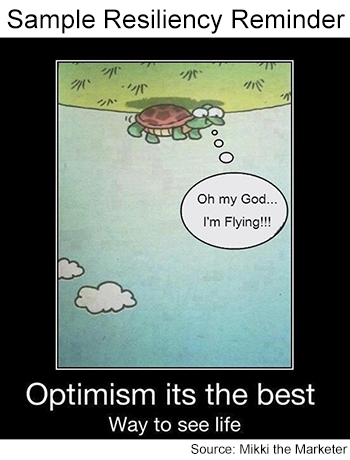Addressing Work-related Traumatic Stress
CFS Strong–Building a Resilient Workforce (known as CFS Strong) was the intervention designed as part of the QIC-WD project to address secondary traumatic stress (STS) among child welfare workers and supervisors in Nebraska’s Division of Children and Family Services (DCFS) agency (for more information see the Site Overview). CFS Strong included multiple components:
- Resilience Alliance (RA), developed by the New York City Administration of Children’s Services-New York University Children’s Trauma Institute, to create a better and healthier work environment, and to help staff develop skills and behaviors that promote their physical and psychological well-being, thereby putting them in the position to do good child welfare work. There is a facilitator guide and a participant manual. The objectives of the intervention were to:
- Recognize work-related stressors

- Recognize different responses to stress, understand the concept of “Survival Mode”
- Use Cognitive Behavioral Therapy (CBT) strategies to reframe and normalize responses
- Understand and promote techniques to manage avoidance, control, self-defeating statements, and encourage a sense of hopefulness
- Understand the link between Stress and Mastery
- Enhance the ability to self-regulate thoughts, emotions, and behavior
- Demonstrate the connection between social support and emotional well-being in the context of a stressful environment
- Advance collaboration among staff
- Peer Support Groups (PSG), to reinforce the core RA concepts and support team cohesion. This portion of the intervention was created by DCFS and the QIC-WD, modeled after RA.
- Resiliency reminders, sent as text messages to all participants to remind them of key RA concepts throughout the implementation of RA and PSG.
- Restoring Resiliency Response© (RRR) debriefings, created by the New York Society for the Prevention of Cruelty to Children (NYSPCC), in response to a traumatic event (such as the death of a child on the agency caseload). Sessions included integration of education, emotional expression, cognitive restructuring, and healing.
 The RA and PSG group sizes were between 10-15 people and included two treatment-randomized supervisory teams, resulting in 14 groups statewide (remaining supervisory teams served as control groups). Supervisors and workers participated in the groups together. RA and PSG groups met during the workday and staff were strongly encouraged to attend. RA sessions occurred one hour a week, for 24 weeks, and occurred in person. One group met every-other-week for two hours to lessen the burden of driving distance within more rural communities. For RA, groups were led by an external facilitator who had experience working with trauma survivors. Some of the facilitators had been case workers, which helped in their understanding of the pressures and realities of the job. After RA, groups transitioned into peer-led, Peer Support Groups (PSG). Most PSG meetings were monthly, although some continued the weekly frequency of RA. PSG sessions lasted 60-90 minutes. Each peer-led session could be organized by one or multiple group members and each group determined who led the session, how often and when they met, and what activities they wanted to do together. PSG were supposed to meet face-to-face for six months following the completion of RA; however, the 2020 pandemic disrupted Nebraska’s implementation of PSG. Some groups moved to virtual meetings, others postponed in hopes of meeting in person. Eventually some groups combined multiple or cancelled their final PSG sessions.
The RA and PSG group sizes were between 10-15 people and included two treatment-randomized supervisory teams, resulting in 14 groups statewide (remaining supervisory teams served as control groups). Supervisors and workers participated in the groups together. RA and PSG groups met during the workday and staff were strongly encouraged to attend. RA sessions occurred one hour a week, for 24 weeks, and occurred in person. One group met every-other-week for two hours to lessen the burden of driving distance within more rural communities. For RA, groups were led by an external facilitator who had experience working with trauma survivors. Some of the facilitators had been case workers, which helped in their understanding of the pressures and realities of the job. After RA, groups transitioned into peer-led, Peer Support Groups (PSG). Most PSG meetings were monthly, although some continued the weekly frequency of RA. PSG sessions lasted 60-90 minutes. Each peer-led session could be organized by one or multiple group members and each group determined who led the session, how often and when they met, and what activities they wanted to do together. PSG were supposed to meet face-to-face for six months following the completion of RA; however, the 2020 pandemic disrupted Nebraska’s implementation of PSG. Some groups moved to virtual meetings, others postponed in hopes of meeting in person. Eventually some groups combined multiple or cancelled their final PSG sessions.
 Throughout the RA and PSG portion of CFS Strong, participants received weekly resiliency reminders through text messages on their work mobile phone. Messages were structured to remind participants of key RA concepts and included fun images or links to content related to the intervention.
Throughout the RA and PSG portion of CFS Strong, participants received weekly resiliency reminders through text messages on their work mobile phone. Messages were structured to remind participants of key RA concepts and included fun images or links to content related to the intervention.
The final component of CFS Strong was RRR, implemented following the completion of RA and PSG. The RRR debriefings were led by a trained facilitator (some of the same facilitators that led the RA groups) with a clinical background, as recommended by the purveyor. RRR was originally planned to be implemented statewide; however, due to the pandemic and contracting delays, it was determined that this part of the intervention would be piloted in a limited capacity. RRR sessions were delivered to small groups (1-8 individuals) after a qualifying traumatic event occurred. Supervisors were asked to encourage workers to participate in these sessions, but they were only mandatory for a child death. Separate events were held for supervisors, as needed. Eligible traumatic events included:
- Child fatality
- Child experiencing severe physical or sexual abuse or neglect
- Homicide cases due to domestic violence
- Violence or threats of violence against staff
- Other work-related acts or events of a similar serious nature
CFS Strong was designed to build resiliency and help address work-related trauma – both as an acute incident and ongoing, recognizing this stressor as an occupational hazard among the child welfare workforce.